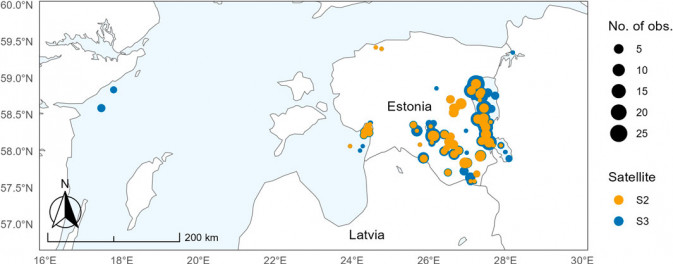
SpongeBoost’s paper evaluates in-water algorithms for eutrophic and absorbing waters
The SpongeBoost project has published its first scientific paper: “Suitability of different in-water algorithms for eutrophic and absorbing waters applied to Sentinel-2 MSI and Sentinel-3 OLCI data.”
This study evaluates how accurately satellite-based algorithms estimate water quality in optically complex environments such as eutrophic and absorbing lakes and coastal areas. Researchers utilised data from the Sentinel-2 MSI and Sentinel-3 OLCI satellites, comparing satellite-derived parameters, such as inherent optical properties (IOPs) and optically active substances (OASs), with in situ measurements.
Researchers from the Institute of Carbon Cycles, Helmholtz-Zentrum Hereon Geesthacht, Germany, the University of Tartu, Estonia and the Estonian University of Life Sciences gathered samples from 42 Estonian lakes and the Baltic Sea. This included two of the largest lakes in Estonia, Lake Peipsi and Lake Võrtsjärv, as well as numerous smaller lakes and coastal sites.
The research team assessed the performance of several in-water algorithms applied to Sentinel-2 MSI and Sentinel-3 OLCI data to improve understanding of their suitability for monitoring complex waters. A particular focus was on evaluating how factors like proximity to shore influence the accuracy of satellite-derived water quality estimates.
The findings highlight the challenges of monitoring water quality in optically complex environments and the need for further development of satellite-based in-water algorithms.
The paper is available on Zenodo.